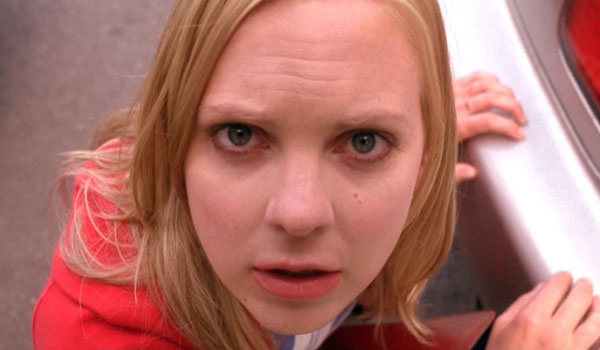
Written by Amber Leab.
Contrary to popular belief, you need not be stoned to enjoy a stoner comedy. You just need to be a dude.
Or so I thought, when I came upon Smiley Face, starring Anna Faris as a stoner who happens to be female, starring in a movie that offers mindless entertainment but still manages to be smart.

The plot is typical stoner-flick, road-movie material: character has a destination/goal and encounters obstacles on the way there, which are funny and at times poignant. Jane F. (Faris), a twenty-something wannabe actress/pothead, has a busy day ahead of her: she needs to pay the electric bill to avoid the power being shut off, and go to an audition–all while not eating her roommate’s plateful of cupcakes in the fridge marked “These cupcakes are RESERVED for SCI-FI EXTRAVAGANZA-CON!!! Do NOT eat! That means YOU Jane.” In a fit of mid-morning munchies, she eats said cupcakes, and you can probably guess why Steve wrote such an enthusiastic note about them.
Why do I love this movie? Jane graduated summa cum laude with a degree in economics, yet she’s half-heartedly trying to be an actress, though her only experience seems to be a regional root beer commercial. In other words, she’s not lazy or stupid, just a slacker. We have so many twenty- and thirty-something male slackers in film, and we’re all supposed to just adore them. (Boys being boys! Slobs in need of feminine domestication!) Female slackers are a rarity. Women in movies are supposed to be highly functioning and successful. They fall in love with slackers (who then save them from their uptight, bitchy selves). Jane isn’t interested in love, or romance, or success. She’s interested in saving her thousand-dollar mattress from the dealer who threatens to take it if she doesn’t pay her debt.

There are major differences between this and other stoner movies I’ve seen. First, and most obvious, is that we’ve never had a female protagonist. Sure, there have been stoned girlfriends and minor lady players, but never have I seen the main character of a stoner comedy be a woman. Second, and just as important, Jane does not have buddies who get stoned with her. She’s all alone (after a brief debate with her dealer about the state of marijuana as a black market item in a “laissez-faire paradigm, or whatever”), stoned and entirely alienated from the world around her. Her interactions are all with people who are sober and generally hostile toward her, from a casting agent to a manager in a pork processing plant, to the guy (Krasinski) she uses for a ride to Venice, who happens to be madly in love with her. Her utter alienation allows viewers to solely identify with her, regardless of the viewer’s gender. That’s pretty cool.

Alienation might just be the theme of the whole movie. Jane might have lost her friends by failing to repay the money she borrowed from them, but she’s also a woman walking around in a male genre. It’s no coincidence that the book accompanying her on the journey through L.A. declared alienation a necessary requirement for the functioning of capitalism (I’ll leave it up to you to analyze that final, wonderful scene with the manuscript). Jane is alone and lost in a world that seems to be suspicious of her every (paranoid, high) move, but with a few strange helper characters, she might get where she’s going.
Or not.
